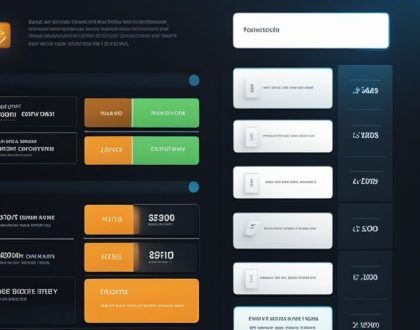Payment System Scalability in iGaming

It’s crucial for companies operating in the iGaming industry to understand the significance of payment system scalability to ensure seamless transactions and sustainable growth. As the online gaming sector continues to expand rapidly, the ability of payment systems to accommodate increasing transaction volumes and handle sudden spikes in activity becomes paramount.
Ensuring a scalable payment system not only enhances customer experience by providing smooth and efficient payment processes but also safeguards against potential bottlenecks and failures during peak periods. Companies must proactively invest in scalable solutions to meet the growing demands of the iGaming market and stay ahead of the competition.
Understanding iGaming Payment Systems
Before delving into the scalability of payment systems in iGaming, it is crucial to understand the intricacies of how these systems operate. The payment ecosystem in iGaming is vast and complex, with various stakeholders involved in facilitating transactions between players and operators. Payment systems in iGaming refer to the methods and processes through which players deposit funds into their accounts, place bets, and withdraw their winnings.
Types of Payment Systems Used in iGaming
- Credit and Debit Cards: Widely accepted by most iGaming platforms, offering convenience and quick transactions.
- E-wallets: Such as PayPal, Skrill, and Neteller, provide secure and efficient payment options for players.
- Bank Transfers: Direct bank transfers are preferred by some players for larger transactions.
- Prepaid Cards: Offer a degree of anonymity and control over spending for players.
- Cryptocurrency: Growing in popularity due to its decentralized nature and increased security measures.
The diversity of payment systems used in iGaming highlights the importance of catering to the preferences and needs of a broad player base. The efficiency and security of these systems are necessary to ensure a seamless gaming experience for players. The integration of multiple payment options is a key strategy for iGaming operators to attract and retain customers.
Challenges Faced by iGaming Payment Systems
Any discussion of iGaming payment systems must address the challenges that operators face in ensuring smooth and secure transactions. 1. Regulatory Compliance: Adhering to various international regulations can be complex and costly. 2. Fraud Prevention: With the rise of online fraud, operators must implement robust security measures to protect players’ financial information. 3. Transaction Fees: High fees associated with certain payment methods can impact profitability. 4. Cross-border Transactions: Dealing with different currencies and regulations can create logistical challenges. 5. User Experience: Balancing security measures with seamless user experience is crucial to retaining players and fostering trust in the platform.
Understanding the dynamics of iGaming payment systems is necessary for operators looking to scale their businesses effectively. By overcoming the challenges and leveraging the benefits of various payment methods, operators can create a competitive edge in the industry. Adapting to technological advancements and user preferences is key to developing a robust payment system that meets the evolving needs of the iGaming market.
The Concept of Scalability in Payment Processing
Definition of Scalability
Payment system scalability in the iGaming industry refers to its ability to efficiently handle an increasing volume of transactions as the business grows. Some key aspects of scalability include the system’s capacity to accommodate a higher number of users, process a larger number of transactions, and adapt to changing technological advancements without compromising performance.
Signs of Poor Scalability in Payment Systems
Payment systems that exhibit signs of poor scalability may experience slow transaction processing times, frequent system crashes during peak hours, and an inability to support a growing user base. Any of these issues can lead to dissatisfied customers, decreased revenue, and ultimately, damage to the brand’s reputation. It is crucial for iGaming companies to address scalability concerns proactively to ensure a seamless payment experience for their users.
This is why monitoring key performance indicators such as transaction speed, system uptime, and user load capacity is necessary for identifying scalability issues before they impact the business. Strong payment system scalability is not only crucial for meeting current customer demands but also for future-proofing the business against rapid growth and increased transaction volumes.
Technologies Driving Payment System Scalability
Cloud-Based Solutions
One of the key technologies driving payment system scalability in iGaming is the adoption of cloud-based solutions. Cloud computing offers iGaming operators the flexibility to scale their payment systems according to demand. By utilizing cloud services, companies can easily adjust resources to accommodate fluctuating transaction volumes, ensuring seamless payment processing for their players.
Blockchain and Cryptocurrencies
Cryptocurrencies have emerged as a disruptive force in the iGaming industry, offering a decentralized and secure payment option for players. Blockchain technology, which underpins cryptocurrencies like Bitcoin and Ethereum, provides transparent and immutable transaction records, enhancing the security and efficiency of payment systems in iGaming. Players can enjoy faster transactions and lower fees when using cryptocurrencies, making them an attractive alternative to traditional payment methods in the iGaming sector.
Another technology driving payment system scalability in iGaming is the development of innovative payment gateway solutions. These advanced gateways offer enhanced security features, seamless integration with various payment methods, and real-time transaction processing capabilities. iGaming operators can enhance the overall payment experience for their players and optimize transaction processing efficiency by leveraging these cutting-edge payment gateway technologies.
Advances in Payment Gateway Technology
With the increasing demand for secure and efficient payment processing in iGaming, advanced payment gateway technologies play a crucial role in enhancing scalability. These solutions enable iGaming operators to expand their payment options, improve transaction speed, and strengthen fraud prevention measures. For instance, some payment gateways offer tokenization services to safeguard sensitive payment information and reduce the risk of data breaches.
Regulatory Considerations for Scalable Payment Systems
Compliance with iGaming Regulations
Keep in mind that the iGaming industry is heavily regulated in many jurisdictions around the world. This means that any payment system used in iGaming must comply with various stringent regulations to ensure legality and security. Operators must adhere to anti-money laundering (AML) laws, Know Your Customer (KYC) requirements, and other regulations to prevent fraud and protect users.
Impact of Regulation on Payment System Design
Any scalable payment system in iGaming must be designed with regulatory requirements in mind. Regulations can impact the design of payment systems in terms of transaction limits, reporting requirements, and the use of specific payment methods. Failure to comply with regulations can result in hefty fines, loss of license, and damage to the reputation of the operator.
Impact: It is crucial for payment system designers to prioritize regulatory compliance in their designs. Non-compliance can have severe consequences for iGaming operators, including legal repercussions and loss of trust from players. Ensuring that payment systems are designed to meet and exceed regulatory standards is vital for the long-term success and sustainability of any iGaming platform.
Strategies for Achieving Scalable Payment Solutions
Despite the rapid growth of the iGaming industry, many companies face challenges when it comes to scaling their payment systems. In order to keep up with increasing transaction volumes and ensure a seamless user experience, businesses need to implement effective strategies for achieving scalable payment solutions. In this chapter, we will explore some key approaches that can help iGaming operators overcome scalability issues and meet the demands of their growing customer base.
Capacity Planning for Payment Systems
On the path to achieving scalable payment solutions, capacity planning plays a crucial role. By forecasting transaction volumes and system loads, businesses can proactively allocate resources and optimize their infrastructure to handle peak traffic without any disruptions. It involves analyzing historical data, monitoring current trends, and making projections for future growth to ensure that the payment system can scale seamlessly as the business expands.
Automation and Machine Learning in Fraud Detection
On the frontier of payment scalability, automation and machine learning have revolutionized fraud detection in the iGaming industry. By leveraging advanced algorithms and real-time analytics, businesses can detect and prevent fraudulent activities quickly and efficiently. Machine learning algorithms can identify patterns and anomalies in transaction data, flagging suspicious behavior for further investigation. This automated approach not only enhances security but also improves the overall payment system performance.
It is important for iGaming operators to continuously enhance their fraud detection capabilities by integrating automation and machine learning technologies. These tools not only help in preventing fraudulent activities but also improve operational efficiency by reducing manual intervention. Ensuring a secure and seamless payment experience for customers is paramount in the iGaming industry, and automation and machine learning are powerful allies in achieving this goal.
User Experience and Scalable Payment Systems
Satisfaction: Optimizing Transaction Speed for User Satisfaction
For online gaming platforms, user experience is paramount. One key aspect is transaction speed when it comes to payments. Slow payment processing can lead to frustration and potentially drive customers away. Optimizing transaction speed for user satisfaction is important in ensuring a seamless and enjoyable gaming experience.
Implementing scalable payment systems that can handle a high volume of transactions quickly and efficiently is crucial. By leveraging technologies such as real-time processing and advanced fraud detection, gaming operators can provide users with fast and secure transactions, improving overall satisfaction levels.
User: Multi-Currency and Cross-Border Payment Flexibility
For international iGaming platforms, offering multi-currency and cross-border payment flexibility is important to attract a global customer base. Users from different regions expect to be able to deposit and withdraw funds using their preferred currency and payment methods. Providing this flexibility can enhance the user experience and increase customer loyalty.
MultiCurrency: By supporting multiple currencies and enabling seamless cross-border transactions, gaming operators can cater to the diverse needs of their users. This not only improves user satisfaction but also expands the platform’s reach to a wider audience, driving growth and revenue.
To wrap up
On the whole, payment system scalability is a critical aspect of the iGaming industry that can greatly impact user experience and operational efficiency. As the sector continues to grow and evolve, it is imperative for businesses to prioritize scalable payment systems that can handle increased transaction volumes, diverse payment methods, and varying regulatory requirements across different regions.
By leveraging advanced technologies, implementing efficient payment processing solutions, and staying abreast of industry trends, iGaming operators can ensure that their payment systems are scalable, secure, and adaptable to meet the needs of their players and the demands of a dynamic market. With a focus on scalability, iGaming businesses can optimize their operations, enhance customer satisfaction, and drive continued growth in the competitive online gaming landscape.
FAQs:
What is payment system scalability in iGaming?
Payment system scalability refers to the ability of payment infrastructure in the iGaming industry to handle increasing transaction volumes and adapt to growth without compromising performance.
Why is payment system scalability important for iGaming companies?
Scalable payment systems ensure smooth transactions, prevent bottlenecks during peak periods, and support sustainable growth, enhancing customer experience and operational efficiency.
What are the challenges faced by iGaming payment systems?
Challenges include regulatory compliance, fraud prevention, high transaction fees, managing cross-border transactions, and balancing security with user experience.
Which technologies drive payment system scalability in iGaming?
Cloud-based solutions, blockchain and cryptocurrencies, and advanced payment gateway technologies are key drivers of payment system scalability in iGaming.
How can iGaming operators achieve scalable payment solutions?
Strategies include capacity planning, automation and machine learning in fraud detection, optimizing transaction speed, and offering multi-currency and cross-border payment flexibility.
Recommended Posts

MGA Outsourcing Compliance Guidelines
July 3, 2024

Risk Management in Online Gambling
July 3, 2024

Payment Integration – A Technical Overview
July 3, 2024



